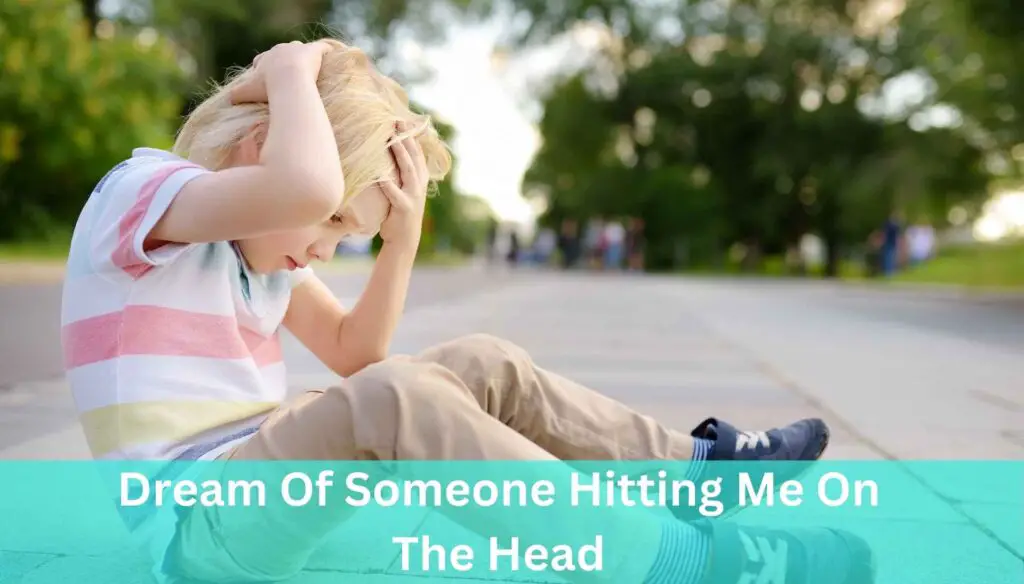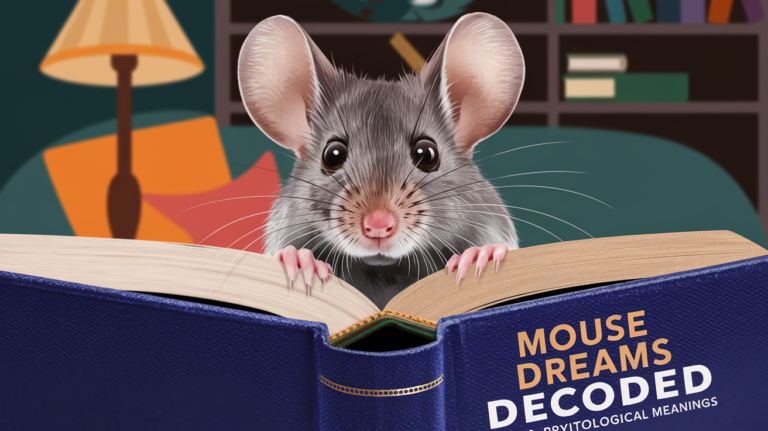A dream that involves being whacked on the head usually symbolizes stress. It may represent sudden understanding or lingering issues in your daily life. These types of dreams usually represent what you’re mentally or emotionally carrying. They signal that it’s go time.
Dreaming about whatever is currently stressing you out. The head represents our ideas and rationality. More generally, it highlights what these kinds of dreams can mean in terms of anxiety over choice, burden, or maturity.
These types of dreams could be messages to focus on self-care. Or maybe they’re just trying to tell you to focus on something you have been avoiding. Considering the overall context of the dream and your present life situation can offer additional perspective.
In the following sections, we’ll dissect Unique Meanings Behind the Dream of Someone Hitting me on the Head, what it could mean, and how it might apply to your life.
What Does Hitting Your Head in Dreams Mean?
Dreams of being hit on the head usually have strong symbolic interpretations. Instead, they may represent intrusions upon your self-perception or inner peace. We often regard the head as the seat of knowledge, ideas, and reason.
Often, when hit in dreams, it is related to emotional struggle, feeling out of control, or feeling inundated. For instance, a dream where a hammer strikes your head might suggest mounting tension from daily responsibilities, leaving you emotionally drained.
Interpretations of Head Injury Dreams
Head injury dreams usually originate from real experiences or repressed feelings. The severity of the hit can show how serious an internal conflict you may be dealing with. A small hit in a dream usually represents somewhat manageable stress.
A heavy hit almost always represents more serious emotional trauma. The third factor, subconscious messages, is important too, often pushing you to work through repressed traumas or emotional dissonance.
Psychological Implications of Head Trauma
If you dream about hitting your head, you may be feeling vulnerable or like you’re being overtaken. Recurring dreams of this sort might indicate unresolved stressors impacting your mental health.
Eighty percent of people who have these dreams report heightened levels of anxiety in their conscious life. The latter requires self-reflection to understand their unforeseen psychological effects.
Spiritual Meanings of Head Impact Dreams
In other cultures, hitting one’s head represents a spiritual crisis or a request to look within. Ancient Egyptians regarded hitting their heads in dreams as a sign from the gods, while Christians connected them to spiritual contemplation or punishment.
These interpretations stress a wish to heal, move on, and grow as a person.
Dream Scenarios and Their Meanings
Dreams about being struck on the head often reflect an unsettling experience tied to our subconscious thoughts. The dream symbolism can reveal various interpretations based on the specific circumstances, such as a scalp wound or a traumatic event. Understanding these dream visions can help us navigate our emotional context and the implications for our relationships.
In these peculiar dreams, the meaning may stem from past trauma or negative thoughts that manifest as a physical head injury. As we explore the possible meanings of dream questions, we can uncover insights that aid in our recovery from emotional struggles and provide clarity regarding our current circumstances.
Hit by a Specific Object
When the dream scenario pertains to being hit by a specific object, that object has the most impact. Being pelted by a book represents an internal conflict over education, information, and personal development. Conversely, a rock symbolizes anger or conflict that has not been dealt with.
The affective state in the dream—whether fear, pain, or confusion—often reflects the emotional or lived reality that we are facing in waking life. Taking time to consider your associations with the object before discussing it can help you make those important connections.
For example, a hammer could represent the weight of stress or demands related to work.
Dream of Someone Hitting You
If another person strikes you in your dream, this can indicate relationship conflicts. Who is the attacker, and why are they attacking you? Understanding if it’s a stranger, friend,d or family member can reveal deeper anxieties and relational tensions in the dreamer’s life.
These types of dreams usually point to a sense of helplessness or repressed rage. Dreaming that a coworker physically assaults you, for instance, might indicate underlying workplace stress or feelings of competition.
Different Types of Head Injuries
The specific nature of the head injury one dreamed about plays a role in its interpretation. For example, a mild bruise can represent the warmth of a minor emotional disappointment, whereas a serious injury may represent a psychological wound.
Below are interpretations of specific injuries:
- Bruise: Temporary emotional hurt or criticism.
- Cut: Lingering emotional pain or unresolved issues.
- Fracture: A major internal conflict or life change.
Explore Emotional and Relational Consequences
Dreams of being struck in the head more frequently have these emotional and relational implications. These recurring dreams can often act as mirrors, reflecting internal and relational conflicts, personal struggles, and unresolved emotions related to relationships and self-perception.
Research in dream consciousness shows that the worries and stresses of daily life often appear in dreamland, mutated into symbolic stories that need to be expressed. Explore these visions to understand the depths of what’s really going on. They dictate the course of your emotional health and your relationships with the people in your life.
Dreams About Betrayal
Dreaming about head injuries could be connected to feelings of going back on your word in intimate relationships. Getting hit in a game can symbolize a psychological trauma from a violation of trust or broken promise.

For instance, if you have a prophetic dream of being struck after an upset, it may be forcing you to address residual resentment or unexpressed pain. Self-reflection can help pinpoint whether these feelings originate from previous experiences or present-day issues.
Healing can start after you recognize these feelings and talk openly with your family and friends to rebuild trust and understanding.
Dreams Reflecting Low Self-Esteem
These dreams involve issues of self-esteem. Dreams in which one feels at risk or under siege can reflect waking concerns about competency or selfhood.
Scientific literature backs the idea that emotional stress tends to leak into dreams, externalizing internal struggles into impactful symbolism. Practices such as therapy, counseling, and journaling allow individuals to reflect on themselves and develop a positive self-image, creating confidence and self-love.
Dreams as Warnings
Finally, these types of dreams can serve as warning signs of unintended harm or choices we are making in our waking lives. Dreams about continual injury may indicate the development of an unconscious knowledge of hazardous conditions.
Resolving these alerts by making changes in advance, such as improving your communication or dealing with stress, may help you feel better mentally and emotionally.
Cultural and Historical Dream Interpretations
Dreams about blunt force trauma to the head have had rich significance regardless of culture or time. In ancient Egypt, Egyptians believed that their dreams were a result of divine intervention. They understood powerful symbols, such as the meaning of the head dream, to be divinely induced omens, advising and/or threatening them.
Greek mythology presents the Furies as allegorical figures who personify the pursuit of justice. They hit people on the head to punish them for moral failures, demonstrating how dreams and responsibility are intertwined. Equally powerful interpretations abound in religious texts, revealing different interpretations of head trauma.
In the Bible, head injuries are often a sign of God’s punishment. For instance, Proverbs 16:18 warns of the dangers of pride, often connected to the idea of downfall or suffering as a consequence. Tales of King Nebuchadnezzar’s madness and Abimelech’s crushed skull reinforce judgment and reaping what one sows.
In Christian dream communities, dreams of brain damage can indicate a spiritual attack, leading the dreamer to self-reflect and work toward emotional and spiritual healing. By interrogating these kinds of beliefs, we can start to unpack what is at stake in these dreams.
The biblical account of Jesus’ face being punched during his trial conveys the idea of final judgment and sacrifice. It makes sense that it would be something so heavy with themes of redemption and humanity’s strife, reflecting on our relationship with trauma.
In a recent survey, 70% of Chinese people considered dreams as a form of spiritual guidance. This is a testament to how dream interpretations, specifically Bustan’s, remain incredibly pertinent, even in today’s world. Understanding cultural contexts enriches our perspective on these dreams, offering a meaningful way to reflect on personal circumstances and beliefs.
Psychological Theories on Head Impact Dreams
Dreams featuring impacts to the human head carry profound significance rooted in psychological theories. Understanding these psychoanalytical views aids in revealing the dream symbolism hidden within such dreams and their connection to an individual’s lived experience. By grasping these theories, you can tap into your subconscious thoughts and psychological state, ultimately resolving the mysteries of repetitive or unsettling experiences.
Freudian Perspectives
Freud believed dreams were roads to secret wishes and buried feelings. Regardless, a dream about hitting your head could represent deeper issues or traumas hidden in the mind. For example, these types of dreams might be manifestations of repressed rage or guilt, frequently associated with deeper psychological issues or undisclosed aspirations.
Freud placed great importance on analyzing these emotions to understand how they affect a person’s emotional health. When you think back on what could have been—a relationship left unfixed, feelings left unexpressed—it all suddenly feels clear.
As an illustration, a dream about being hit on the head might relate to feeling criticized or remorseful. This parallels biblical narratives, such as King David’s, in which spiritual anguish sparked deep self-examination.
Jungian Perspectives
Jung’s emphasis on symbolism and archetypes provides another perspective. Head impact dreams may indicate real conflicts you’re dealing with. They almost always offer growth opportunities related to ideas such as the “wounded healer” or your “shadow self.
These types of dreams may indicate an inner war being waged between your conscious and unconscious mind, calling for harmony. In Christian contexts, they could represent penance or constant self-betterment, resonating with scripture from Matthew and Luke on humility and the necessity of divine forgiveness.
By attending to these archetypes, you cultivate a better sense of self, which will help you grow by linking your dreams to real-world conundrums or karmic lessons.
Neuroscience and Physical Injury Dreams
Dreams with head injuries usually originate from the intricate inner workings of the brain, which malfunction during sleep. Neurologically, the brain doesn’t just shut down when we are asleep. Rather, spaces such as the amygdala, which manages emotional reactions to stimuli, and the prefrontal cortex, which is involved in rational thought and direct dream content, don’t just shut down when we are asleep.
This reciprocal influence explains how stressful or overstimulating emotions experienced during waking life can manifest as physical injury dreams. Like, say, dreaming of being hit on the head. For example, someone under constant pressure at work might dream about head trauma as a symbolic representation of mental exhaustion.
Brain activity factors heavily into whether such dreams get high up on the vividness/intensity scale. During REM (Rapid Eye Movement) sleep, dreaming enters an especially dynamic phase. During this stage, the brain concocts narratives that can seem painfully lifelike.
This is especially true for those who have REM Sleep Behavior Disorder (RBD). In their case, the line between dreaming and actually doing something while being awake becomes fuzzy. RBD patients may violently act out their dreams, from mimicking a fight to trying to eat invisible food.
According to research, more than 80 percent of people diagnosed with RBD will go on to develop neurodegenerative diseases, like Parkinson’s disease, within 10 to 15 years. This important discovery points to a possible link between dreaming habits and future neurological health.
Somatic experiences shape dream storylines. For example, an outside stimulus, such as a headache or a stiff pillow, could manifest itself in a dream about being hit. Tracking physical signals in slumber can help with dreams.
These artistic cues work alongside the science of neuroscience and physical injury to help storytellers create engaging dream sequences.
Decipher Accompanying Dream Imagery
Even dreams of getting hit on the head have special significance. The imagery within these dreams can provide important insight when interpreting their messages. These dreams can represent your internal conflict or stress, serving as a metaphor for the burdens that are heavy on your mind.
The universe will talk to your subconscious through dreams. It uses coded visual languages akin to Morse code to deliver these crucial ideas. Explore the hues, feelings, and landscapes found in your nighttime imaginings. You’ll uncover deeper layers of significance that so easily go overlooked.
The use of color in dreams deepens their importance. A red-hued environment usually indicates anger or urgency. More subtle shades, such as blue, help inspire a sense of serenity or clarity.
The emotions felt in a dream—whether fear, relief, or confusion—offer insight into how your subconscious processes real-life events. The surroundings play a pivotal role. A chaotic setting might reflect inner turmoil, while an organized space could suggest a need for control or order.
Common dream imagery tied to head injuries includes:
- Falling objects: Symbolizing unexpected challenges or pressures.
- Blood or wounds: Indicating emotional pain or unresolved issues.
- Bright lights: Suggesting clarity, revelation, or divine intervention.
Historical and cultural contexts can add depth to this understanding. Biblical narratives, such as King David’s, indicate that head wounds represent a spiritual test. They resonate deeply with an internal demand for self-discovery and reinvention.
Similarly, for the Lakota tribe, dreams like these were considered harbingers of upcoming victories, a sign that things could go more positively.
Differentiate Neural Phenomena and Symbolism

Neural dreaming continues to be a complex interpretation. Neural phenomena occur due to brain functions during REM sleep, in which the amygdala, hippocampus, and neocortex work together. While the amygdala significantly escalates emotional response, the hippocampus labors to work through short-term memories, and the neocortex attempts to extract long-term memories.
For instance, if the events of your day were very stressful, your dream could reflect that stress in more extreme or bizarre forms. This helps clarify why dreams can often seem nonsensical but relatable—they mirror waking life events but are filtered through the lens of neural phenomena.
Symbolic representations in dreams tend to have psychological or cultural significance. To be struck on the head in a dream could represent an intellectual affront. Or it might just be an indication of opposition to what you’re doing or your motives.
This is consistent with symbolic interpretations of religious scripture, wherein the head is frequently associated with intelligence and moral guidance. The Bible mentions figures punished for pride, which might parallel how dreams use head injuries as metaphors for internal struggles or lessons.
Awareness of symbolic components helps you interpret individual or collective meanings, enriching the dream’s significance with depth. Learning these differences clarifies dream interpretation.
An incurable, lifelong recurring dream of head trauma affects 1 in 20 adults forever. This strange experience can be a result of fears left unaddressed or stress-informed neural phenomena. Once you learn to critically analyze whether your dream is coming from emotional memory or metaphorical imagery, you can step back and make a more informed decision.
This process increases your awareness of your inner world. It’s invaluable emotional work as you process and unpack your decisions while absorbing your waking life experiences.
Therapeutic Approaches to Vivid Dreams
Dreams about receiving a concussion or similar trauma can leave strong feelings, especially connected to stress or unfinished business. Understanding the meaning of the head dream is essential to address these vivid dreams. First, it’s important to explore what causes these blueprints for butterflies and volcanoes, and how they can affect emotional health.
Therapists trained in dream analysis or cognitive-behavioral therapy (CBT) serve as effective guides through this transformative process. They can assist you in uncovering what your dreams may be trying to tell you, which might include repressed trauma, anxiety, or other hidden concerns. For instance, someone who has just been in a crash may inadvertently process elements of that traumatic event while they sleep, revealing subconscious thoughts.
This process provides a deeply therapeutic outlet for their troubled feelings, as the dream reveals the emotional context of their experiences. Therapy is crucial in addressing the meaning behind these dreams, especially when they stem from past trauma.
Dreams are a way for us to process these more complicated, sometimes dangerous emotions. Therapists help you navigate this innate coping mechanism. CBT, specifically, has been shown to be highly effective in treating nightmares and other sleep-related issues.
By helping you identify thought patterns or triggers linked to distressing dreams, CBT provides actionable strategies to reduce their frequency and emotional intensity. Practices like journaling dream content and reframing the negative associations help you re-imagine dreams in a positive light.
Finding professional guidance is another way to help build more general coping strategies. If distressing dreams disrupt sleep, practical steps like engaging in relaxing activities, such as reading or listening to soft music, can help restore calm.
While less than 10% of us experience nightmares, effective management can greatly improve a person’s quality of life. Therapy offers tools to build resilience and maintain emotional balance.
Conclusion of Behind the Dream of Someone Hitting Me on the Head
It may seem odd to dream about being hit on the head. These dreams could be manifestations of stress, lingering emotions, or even physical signals from your body during sleep. The interpretation usually relies on the feelings and context associated with the dream. Whether linked to personal struggles, memories, or just your brain processing daily life, these dreams can reveal more about your inner world.
Look for trends or things that keep coming up. If these dreams are causing you distress, working with a therapist or through dream journaling can further tap into these ideas to find more personal significance. Every dream is different, so go with what resonates most with you. Digging into them is sure to help you get a better sense of what makes you tick and how your mental health is doing.
Frequently Asked Questions
What does dreaming of being hit on the head symbolize?
Dreaming of getting hit on the head, a common dream symbol, usually represents repressed anger or anxiety. This peculiar dream might also indicate a sense of vulnerability, overwhelm, or mental exhaustion in your current circumstances. The exact meaning depends on the overall context and emotional tone of the dream vision.
Can dreams about head injuries indicate suppressed emotions?
Indeed, these kinds of dreams can be signs of repressed feelings or unmet psychological stress, often reflecting peculiar dream symbolism. Your subconscious is urging you to address hidden issues, confront fears, or process past traumas for emotional relief.
Are head impact dreams related to real-life physical health?
Dreams of being hit in the head may symbolize underlying pain or illness, such as migraines or stress, and can reveal subconscious thoughts about your mental state. They often carry significant dream symbolism, indicating that these peculiar dreams should not be taken literally. Consulting a healthcare provider is crucial if you suspect serious health issues.
How do cultural beliefs influence head injury dreams?
All these aspects contribute to how dreams are interpreted, especially when considering the dream symbolism of head trauma. Culturally, many interpret a physical head injury in dreams as a beacon of caution, while for others, it represents an unsettling experience that signifies transformational change or spiritual awakening. Recognizing your cultural lens can provide a more profound understanding of these various interpretations.
What psychological theories explain these dreams?
Psychologists commonly associate dreams of head injury, such as a scalp wound or swollen head, with anxiety and unresolved tension. This dream symbolism may reveal an unconscious fear of failure, reflecting past trauma or inner conflict.
Can recurring dreams about being hit on the head mean something specific?
Recurring dreams often serve as a dream symbol for unresolved issues or recurring challenges in your life. They may reveal subconscious thoughts about a difficult situation or highlight a past trauma that needs to be addressed, indicating the need for recovery.
How can you reduce vivid or distressing dreams of head injuries?
Consider relaxing pre-sleep rituals, such as meditation or journaling, to settle your thoughts and promote a peaceful night’s rest. If these types of peculiar dreams continue to recur, consider seeking counseling to help you uncover the emotional context or subconscious thoughts behind them.







